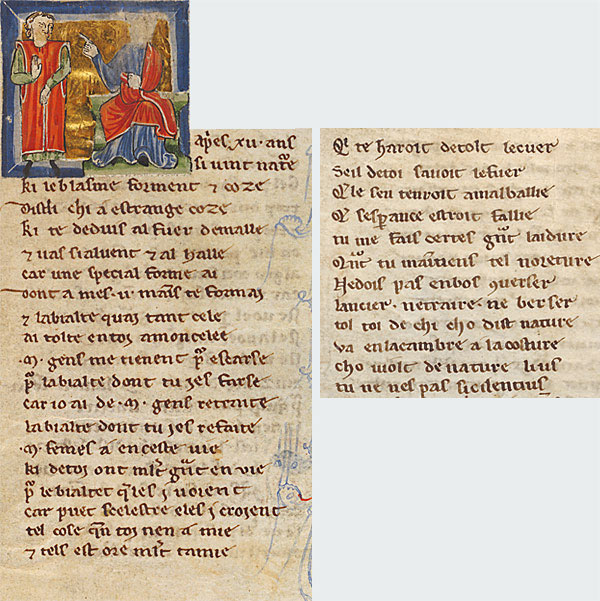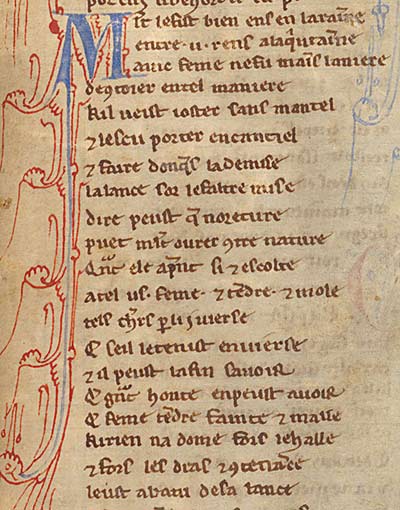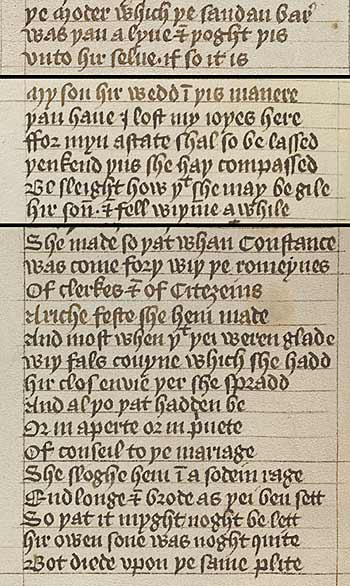Nature or Nurture

'Go to the bed-chamber and stitch a seam'
Woman as ‘domestic goddess’ is probably what many people would think of when considering the medieval period. Medieval women are often defined by the ‘inner’ aspects of their life inside the home, in contrast to men’s concerns in the outside world.
The domestic sphere was often busy, as medieval households could be large and extended. Widowed mothers might come to live with their sons; nephews, nieces or cousins might live with their wealthier relatives for a while as pages or ladies-in-waiting; and the high death rate meant that many people re-married after their husband or wife died, making step-families very common. As nowadays, family relationships could sometimes be fraught, as well as loving and nurturing.
Rich families depended on servants to undertake domestic tasks. Their hard work was occasionally recognised. St Zita of Lucca was a diligent servant to the Fatinelli family during the 13th century. Her piety and hard work endeared her to her employers, and her cult became popular among ordinary women who could relate to her story. She is often depicted with a bunch of keys, indicating how well she was trusted. Items relating to St Zita are shown in the Saints section of this resource.
The following extracts from literary and historical texts give some insights into women’s roles in medieval society.
Transcripts and translations for manuscript items are also available for download:
Document 1: Heldris de Cornuälle, ‘Le Roman de Silence’, lines 2500-2530 (early 13th century, French).
Nature made the girl Silence extremely beautiful, but she has been brought up as a boy. Silence, aged 12, can’t decide whether it is best to be a boy or a girl. This extract is part of a longer passage in which Nurture, Nature and Reason all give their opinions. In these lines, Nature argues that Silence’s beauty is wasted and that the women who are in love with ‘him’ will be angry and disappointed when the truth comes out.
Ref: WLC/LM/6, f. 201r

Transcription and Translation
transcription translation
| Transcription | Translation |
|---|
Apries xii . ans
si uint nature
Ki le blasme forment et coze
Distli chi a estrange coze
Ki te deduis al fuer demalle
Et uas sialuent et al halle
Car une special forme ai
Dont a mes . ii . mains te formai
Et labialte quai tant cele
Ai tolte entoi amoncelee
. M . gens me tienent por escarse
Por labialte dont tu ies farse
Car io ai de . M . gens retraite
Labialte dont tu ies refaite
. M . femes a enceste uie
Ki detoi ont moult grant en vie
Por lebialtet queles i uoient
Car puet scelestre eles i croient
Tel cose quen toi nen a mie
Et tels est ore moult tamie
Qui te haroit detolt lecuer
Seil detoi sauoit lefuer
Quele sen tenroit amalballie
Que sesperance estroit fallie
Tu me fais certes grant laidure
Quant tu maintiens tel noreture
Nedois pas enbos conuerser
Lancier . netraire . ne berser
Tol toi de chi cho dist nature
Va enlacambre a la costure
Cho uiolt de nature lius
Tu ne nes pas sicilentius |
After twelve years Nature came along
Who accused Silence harshly and scolded her.
She said, 'This is a strange thing
That you amuse yourself like a man,
Going out in the wind and the scorching sun
When I had a special image of you,
When, with my own two hands, I formed you
And with all the beauty I had in store
I have drawn so much of it together in you.
One thousand people accuse me of being miserly
For the beauty with which you are filled to the brim.
I have taken away from one thousand people
The beauty of which you were also made.
There are one thousand women today
Who desire you very much
For the beauty that they see there
For in you being so convincing (as a man) they believe
That you have something that, indeed, you have not.
And because of this they who now love you greatly,
Those (same women) who would hate you with all their hearts
If they really knew how you were made -
They would feel themselves to be maltreated
In that all their hopes and expectations came to an end.
You certainly insult me and do me a great wrong
In leading your life in such a way.
You must not go into the woods to meet with others
Jousting, hawking or hunting with a bow,
Away with you from all of this, said Nature.
Go to the (bed)-chamber and stitch a seam
That is what Nature wishes you to do
You are not Silentius. |
Document 2: Heldris de Cornuälle, ‘Le Roman de Silence’, lines 5145-5164 (early 13th century, French)
The girl Silence is trained to become an expert jouster, despite her gender. The author of the ‘Roman de Silence’ suggests that although Nature is supposed to produce ‘tender, weak and soft’ girls, Nurture (upbringing) can be a stronger force.
Ref: WLC/LM/6, f. 215r

Transcription and Translation
transcription translation
| Transcription | Translation |
|---|
Moult lefist bien ens en larainne
Entre . ii . rens alaquintainne
Ainc feme nefu mains laniere
Decontoier entel maniere
Kil ueist ioster sans mantel
Et lescu porter encantiel
Et faire donques lademise
Lalance sor lefaltre mise
Dire peust que noreture
Puet moult ourer contre nature
Quant ele aprent si et escolte
Atel us . feme . et tendre . et mole
Tels chevaliers par li i uierse
Que seil letenist enuierse
Et il peust lafin sauoir
Que grant honte enpeust auoir
Que feme tendre fainte et malle
Kirien na dome fors lehalle
Et fors les dras et contenance
Leust abatu desa lance |
He did well in the tournament out on the lists
Between the two runs and the quintain.1
Never had there been a woman less reluctant
To mix and converse in such a manner.
Whoever saw him jousting, out there without his cloak,
His shield held en cantiel just before his sword hilt and such his scabbard was protected2
And then at the unseating (of his opponent)
The lance he sets at rest upon the falter3,
They may well say that Nurture
Can do much work to overcome Nature
When she can teach such accomplishments
To such a soft and tender woman.
Many a knight who was thrown by him [Silence],
Had he only been aware
And may at last have known the truth,
What dreadful shame he would have felt
That a woman (so) tender, weak and soft
And who, except complexion, possessed nothing of being a male,
With the clothing and the bearing of a man,
Could have struck him down with her lance.
|
1. The Oxford English Dictionary gives quintain (1440) a similar meaning to a target. However, quintaine (1180) in the Dictionairre de l'Ancien Français gives a jousting dummy serving as a target when practising with a lance. The names probably dates back to the traditions of the Roman army who used 'dummies' made up of five pieces of armour.
2. The shield thus worn appears to have been termed 'ecu en cantiel'. ‘The shield which is large and hollow and charged with ermine ... is suspended from a very long guige in front of the left thigh, immediately behind the sword hilt, thus covering the upper part of the scabbard’. Rev. W. Bramston, A History of the Abbey Church of Minster, Isle of Sheppey, Kent. (1896).
3. faltre: a piece of felt on the saddle where the lance is placed when at rest.
Document 3: Extract from an extent of the manor of Langar and Barnstone, Nottinghamshire (c.1340, Latin)
An extent was a description and a valuation of the manor. Matilda de Herdeby was a bondage or bond tenant (a villein), occupying a toft (a house and some land) under the customary terms of the manor of Langar and Barnstone. This document gives details of the rents and services she owed to her lord. Like others within the manor, Matilda’s family had to spend one day each autumn working on the lord’s land – but the housewife was specifically excluded. Perhaps this shows the importance attached to ‘women’s work’ within the home: while men worked on the land, at a craft, or in trade, the housewife had her own status as manager of the household, which should not be disturbed.
Ref: MS 66/1

Transcription and Translation
| Transcription | Translation |
|---|
|
Tenentes tofftorum in bondagio
Matillda de Herdeby tenet j tofftum in bondagio et reddit per annum . ij . solidos . vj denarios . terminis ut supra Et dabit auxilium secundum numerum animalium suorum
Et debet meterium in Autumpno ad Magna precaria domini cum tota familia excepta . uxore domus Et valet operis illius diei per estimacione ij denarios
et habebit j repastum et valet j denarius et sic valet opus illius diei ultra repastam j . denarius. Et dabit pro quolibet pullano masculino . iij . denarios . pro tolleneto
Et valet tollenetum per annum . [...] Et dabit pannagium porcorum bis per annum . ut supra et valet pannagium per annum [...] Et dabit Merche
tum et LeyrWytum pro filiis suis. |
[Cottars]
Bondage tenants of tofts.
Matillda de Herdeby has 1 toft in bondage and pays 2s 6d per annum at the terms as above [Christmas, Lent, Pentecost and Michaelmas]. And she owes an aid of the above mentioned number of her animals [not specifically mentioned, a sum of money in proportion to the number of animals she owns]. And she owes harvest work in autumn at the chief service of the lord with her whole family except the housewife. And the value of the work of that day shall be assessed at 2d. And she shall have one meal to be valued at 1d. And the afternoon’s work shall be valued at 1d. And she shall give as toll for every male foal 4d. The value of this toll per annum is [blank]. And she shall provide pannage for swine twice in the year as stated and the pannage shall be valued at [blank]. And she shall pay merchet and leywrite for her daughters.
Translation by Professor L.V.D. Owen, in ‘Three Nottinghamshire Manorial Records’, Thoroton Society Record Series Vol XI, Pt. II (1946)
|
Document 4: John Gower, ‘Confessio Amantis’, Book 2, lines 644-652 and 678-713 (composed c.1393, English)
'The Tale of Constance’ includes an extreme fictional example of family strife. A wicked mother-in-law is jealous of her son’s marriage and her consequent displacement as the dominant female in his life. She arranges a massacre at the wedding, at which even her own son is not spared. She puts her son’s fiancée Constance into a boat and sets her adrift with all her wedding goods.
Ref: WLC/LM/8, ff. 31v-32r

Transcripion and Translation
transcription translation
| Transcription | Translation |
|---|
Þe moder which þe saudan bar
Was þan a lyue and þoght þis
Vnto hir selue . if so it is
My son hir wedd in þis manere
Þan haue I lost my ioyes here
For myn astate shal so be lassed
Þenkend þus she haþ compassed
Be sleight how þat she may begile
Hir sone . and fell wiþinne a while
She made so þat whan Constance
Was come forþ wiþ þe romeynes
Of clerkes and of Citeȝeins
A riche feste she hem made
And most when þat þei weren glade
Wiþ fals couyne which she hadd
Hir clos envie þer she spradd
And alþo þat hadden be
Or in aperte or in priuete
Of conseil to þe mariage
She sloghe hem in a sodein rage
Endlonge and brode as þei ben sett
So þat it myght noght be lett
Hir owen sone was noght quite
Bot diede upon þe same plite |
The mother of the sultan was still alive then, and
thought this to herself: ‘If it is so, that my son
would marry her in this manner, then I have lost
my joy here, for my estate [both socially and
politically] shall thus be lessened.’
Thus thinking, she contrived how she might
deceive and beguile her son. And within a while
fell …
… When Constance came forth with the Romans,
their clerics and citizens, the mother had made
them a rich feast. And when they were at their
most joyful, she spread her secret envy with false
conspiracy, and she slaughtered those that had
been in agreement to the marriage, either openly
or in private, everyone along the table as they
were seated, in a sudden rage; her own son was
not unpunished, but died in the same way as the
others.
|
Next page: Inheritance